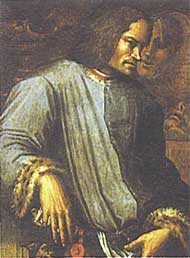Lorenzo de' Medici
Lorenzo de' Medici was one of the two sons of Piero de' Medici, the son of Cosimo de' Medici. Cosimo's son, Piero, was allowed to step into his father's place, but his miserable health prevented him taking an active part in affairs, and his two sons, Lorenzo de' Medici and Giuliano de' Medici, were more in the public gaze.
In his attitude to the arts, Piero was in no way behind Cosimo. His chief friendships were with Alberti, Landini and Benozzo Gozzoli, and he kept up the family traditions by his ardor in acquiring codices and adding to the Medici collection of antiques.
The Medici were connected by marriage with many influential families, and were popular with the poorer people due to the lavish way in which they spent money. Every member of the Medici family had the same object in view: the embellishment of the city and the prosperity of her population. Lorenzo de' Medici was no different.
Education
The education of Lorenzo de' Medici and his brother was the best those times, or we might say any times, could afford. Their tutor was Gentile Becchi, famed for his exquisite Latin, and they learnt Greek from Argyropulos, and Platonic philosophy from Ficino.

Lorenzo de' Medici
by Georgio Vasari
But perhaps the most important instructor of Lorenzo de' Medici and his brother was Cristoforo Landini, professor of poetry and rhetoric at the University, and afterwards promoted to the Chair of Greek and Latin. He was the translator of Aristotle, and wrote a commentary on Dante, in whose steps he followed by his encouragement of the vernacular, and in this he had a marked influence on Lorenzo de' Medici. However, Lorenzo de' Medici always maintained that he owed his taste for poetry to his mother, Lucrezia Tornabuoni, herself an excellent poet, who also undertook the religious education of her children. She was a noble woman, always a power in the family, and Lorenzo de' Medici's best counselor until her death.
Lorenzo de' Medici and his brother were no less proficient in horsemanship and all athletic exercises than in the Humanities, and there is no doubt that the amusements in which they delighted, and which they promoted, greatly enhanced their popularity. The famous tournaments which took place in 1468, and about which so much has been written, bear witness to this. The prize awarded to Lorenzo de' Medici was a silver helmet with a figure of Mars as the crest. The Giostra di Lorenzo was celebrated in a poem by Luca Pulci; and that of Giuliano in a far better, but unfinished, poem by Poliziano, which, however, is addressed to Lorenzo.
In the following year, another pageant took place on the occasion of the marriage of Lorenzo de' Medici with Clarice Orsini. A few months later his father died. The event really made little difference in Lorenzo's position, for he had been at the head of affairs for some time. On the second day after Piero's death, the citizens presented a petition asking the two sons to assume the position occupied by their father and grandfather, and Lorenzo de' Medici accepted the offer. Henceforth, though nominally bankers, the brothers were virtually princes, and rulers of Florence.
Lorenzo de' Medici versus Giuliano de' Medici
Lorenzo de' Medici and his brother Giuliano were contrasting personalities. The younger was singularly handsome, with bright eyes and black curling hair, whereas Lorenzo, though tall and well-built, had a plain, sallow face, with a flat nose and weak eyes; moreover his movements were awkward and his voice thin and harsh. It is one of Lorenzo de' Medici best traits that he never felt any jealousy of Giuliano, but regarded him with immense affection.
But, in 1478, the Pazzi conspiracy, designed to assassinate both brothers, but in which only the younger was killed, put an end to any possible rivalry and, like many unsuccessful plots, it only increased the popularity of those against whom it was initiated. Giuliano de' Medici was buried with every demonstration of public grief, and Lorenzo de' Medici was more than ever the master of the city of Florence.
Lorenzo de' Medici named Lorenzo Il MagnificoLorenzo de' Medici and the Arts